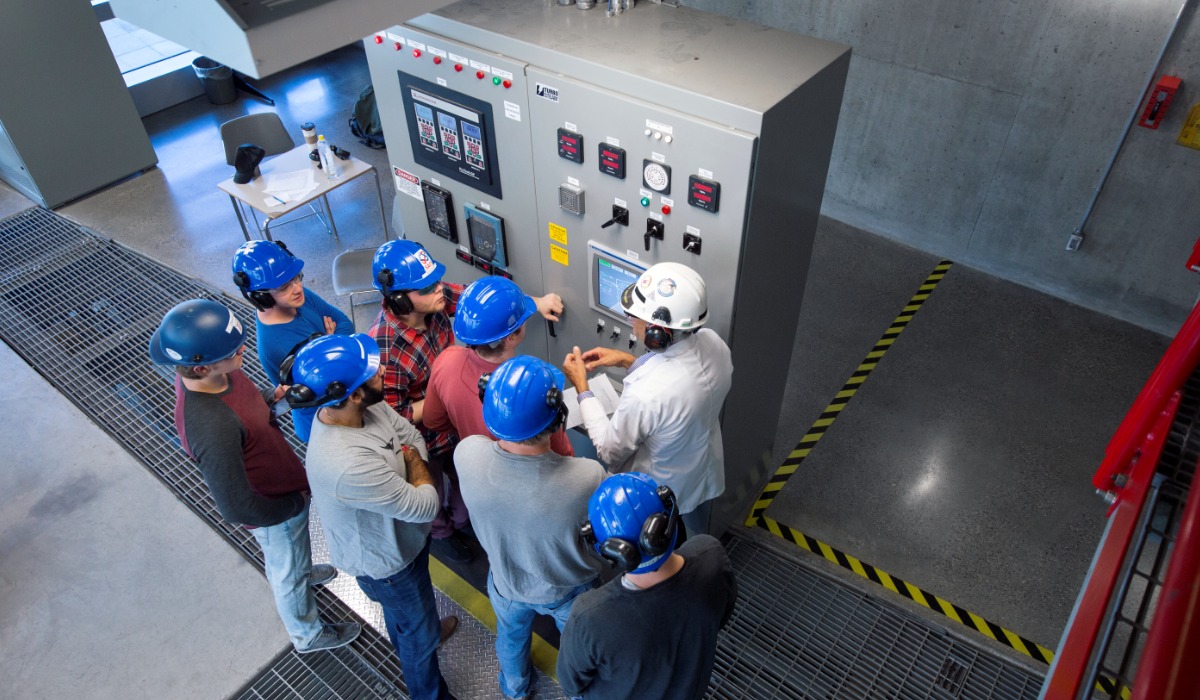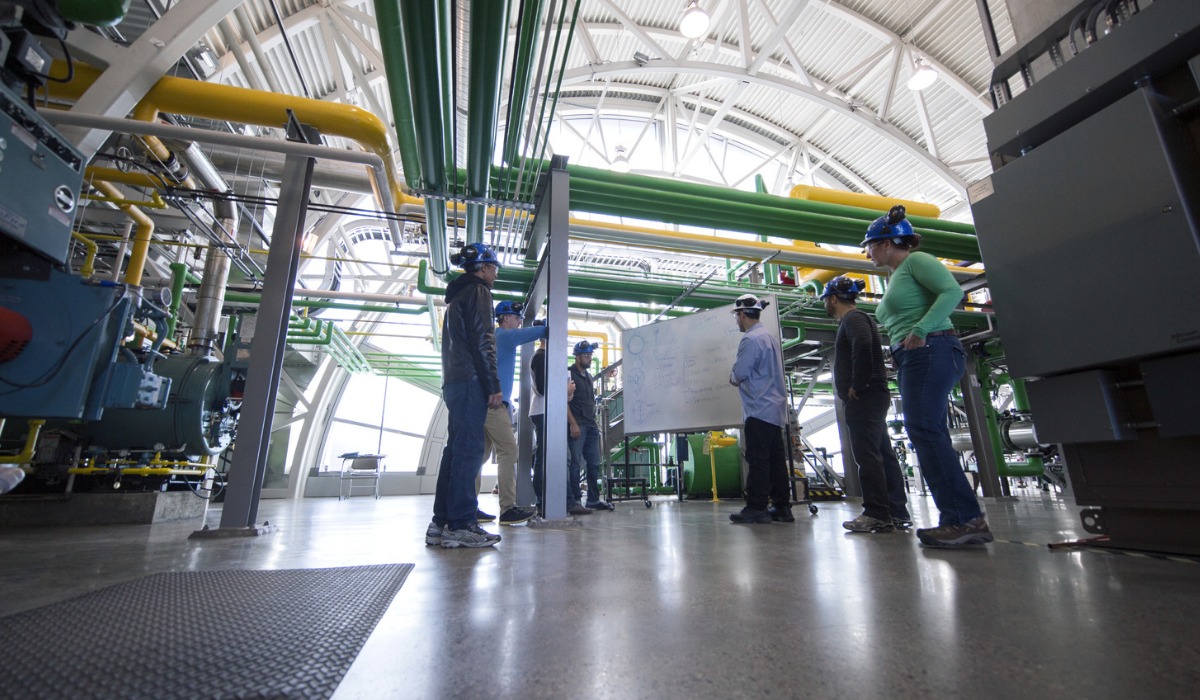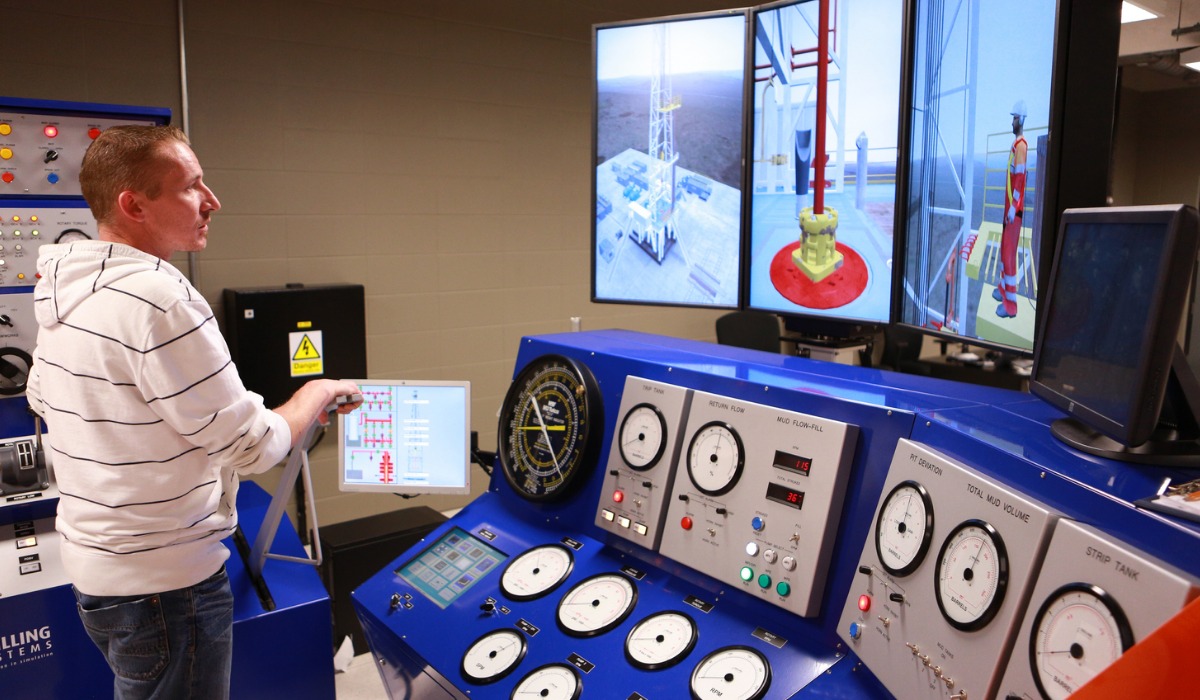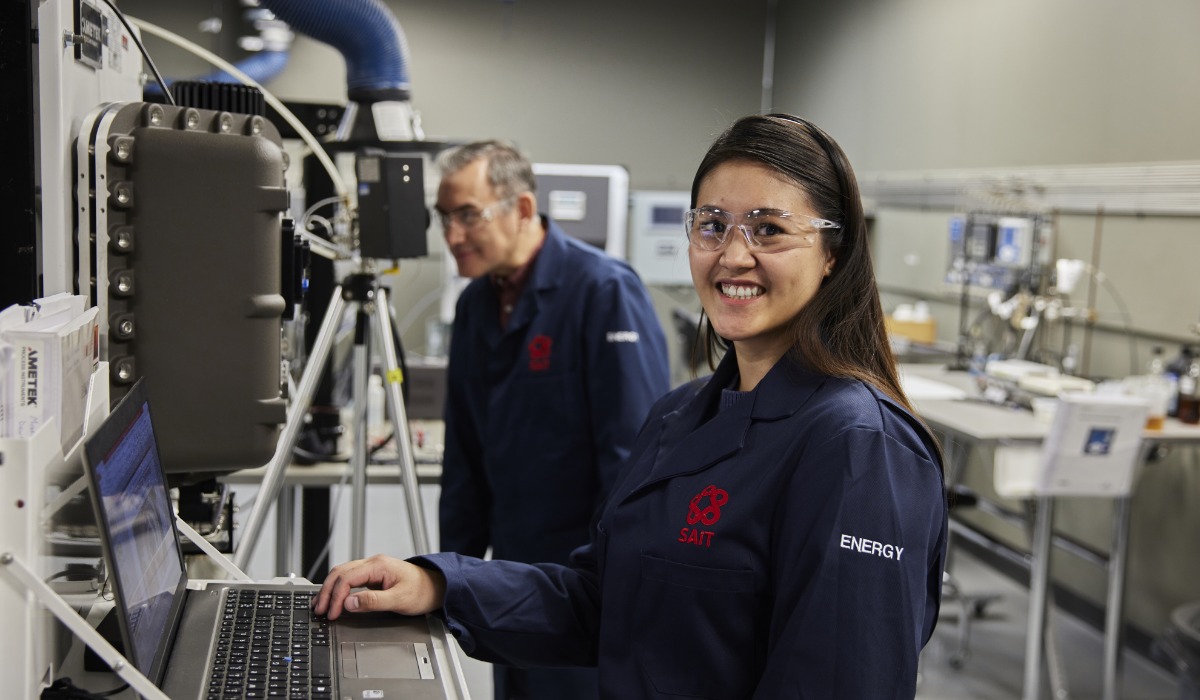Overview
Power and Process Operations is a comprehensive eight-month program designed to equip you with the skills and knowledge necessary to excel as an operator in various power generation and processing industries.
It is the equivalent of a Fourth-Class Power Engineering program. It combines theoretical learning with hands-on laboratory experience utilizing the same type of equipment found in industry, ensuring that you are well-prepared to manage the day-to-day operations of complex power and processing systems safely and efficiently.
In this program, you will:
- learn the fundamentals of boilers, including design, operation and maintenance
- learn about heat and energy transfer and how it's used and managed in power systems
- learn the basics of electricity, electrical circuits, power generation and electrical safety, including how to safely operate electrical equipment in industrial settings
- learn about design, operation, maintenance and troubleshooting of different types of pumps and compressors
- get instruction on workplace safety, including fire safety, hazardous material handling and emergency procedures
- train in the instrumentation used to monitor and control engineering systems, including sensors, transmitters, controllers and actuators
- learn the basics of plant operations and troubleshooting
- learn the fundamentals of internal combustion engines, steam turbines and gas turbines, including design and operation typical to those found in facilities, industry and power plants
- establish the knowledge and skills to operate a refrigeration system used in process industries and facility cooling
- learn the fundamentals of facility environmental conditioning and control, including design and operation of air handling units, chillers and building automation systems
- gain an understanding of the water treatment, testing and analysis that promotes equipment and system longevity, including cooling, heating, steam, condensate and feedwater systems.
Graduates of this program find job opportunities in power generation, petrochemical, fertilizer, pulp and paper, natural gas processing, metallurgical, petroleum refining, food and beverage production industries, and facility operations. Most roles involve shift work and can often be located at remote sites.
This program will prepare you to challenge the Alberta Boilers Safety Association (ABSA) Fourth Class Power Engineer certification exams to earn your certification, setting the stage for a challenging and rewarding career in power and process operations.
Those in power engineering tend to be objective, innovative and methodical.
You need:
- mechanical and some electrical aptitude
- to be physically agile and capable of lifting heavy objects
- good vision, hearing and eye-hand co-ordination
- manual dexterity
- communication skills
- organizational and decision-making skills
- the ability to work with others in a team environment.
You should enjoy analyzing problems and coming up with solutions, working as efficiently as possible, and have no problems adhering to safety standards and codes.
Wearing a hard hat and other PPE in the lab is mandatory. Holding a valid driver's license is strongly encouraged.
Those with serious colour vision defects or who suffer from claustrophobia or fear of heights may have trouble with certain aspects of instruction and may experience problems securing employment.
Graduates can transfer course credits and enter the SAIT Power Engineering Technology program to earn their diploma with one additional year of study.
This program is integrated with the Alberta Boilers Safety Association (ABSA) certification system.
Graduates are eligible for membership in the following professional associations:
- Alberta Boilers Safety Association (ABSA)
- Institute of Power Engineers (IPE)
- International Pressure Equipment Integrity Association (IPEIA)
- National Association of Corrosion Engineers (NACE)
After successfully completing this program, you'll receive a SAIT Power and Process Operations certificate.
Careers and opportunities
Each year, SAIT conducts a survey between February and April to determine the employment rate, salary and satisfaction of our newest SAIT alumni.
![]() 67% graduate employment rate
67% graduate employment rate
Find out more about our graduate employment statistics >
Our graduates may work in the following occupations. Some careers require additional experience and education.
Associated National Occupational Classification (NOC) codes: 22301, 22302, 22312, 70012, 92100, 92011.
Career planning support
Unsure which career path is for you? Here are some recommended career planning resources to help you decide your future.
You can also head to Alberta alis for lots of information about careers in Alberta, including quizzes and labour market information to help you narrow down a path.
Finally, you can take our online career finder quiz, which can help narrow your options based on your current skills and interests.
Courses
The Power and Process Operations certificate requires 30 credits (12 courses) to complete.
The program spans one year, with two semesters.
| Course | Credits |
|---|---|
|
An introduction to chemistry that includes concepts of classification of matter, atomic-base theory, oxidation-reduction and its relationship to electrochemistry and corrosion. A brief introduction is given to organic chemistry. Students are introduced to analytical chemical techniques commonly used in the petroleum industry and water treatment facilities. Equivalents:
|
1.5 |
|
This course is designed to sharpen communication skills specifically related to the daily operation of an industrial plant. |
1.5 |
|
This course explores interpersonal communications and how strong communications skills may be applied to positive workplace relationships. The course work is designed to help you become a more effective communicator in the increasingly diversified workplace. |
1.5 |
|
This applied computer course provides students with critical electronic communications, data and file management skills, along with a strong focus on using common productivity applications to format, calculate, analyze, visualize, and present or report data and information. Equivalents:
|
1.5 |
|
Provides an introduction to safety problems and safe practices in industry and an appreciation of the potential environmental impact of air, water, waste and noise. Some discussion on the handling of waste and perception of risk, environmental responsibility and sustainable development are included. Equivalents:
|
1.5 |
|
This course will provide the resources for students to develop skills and experience in boiler plant general mechanical and preventative maintenance. Students will learn to perform the following procedures: identifying hand tools, precision measurement, drilling and tapping, threading pipe, valve packing, and flange gasket replacement. Equivalents:
|
1.5 |
|
Fluid Circuit, Centrifugal Pumps, Refrigeration, Heat Exchanger, Heat Loss, Climbing Film, Evaporator, Fractionation (Distillation), Gas Absorption, Centrifugal Pump Simulator Lab, Centrifugal Compressor Simulator Lab, Flash Drum Simulator Lab, Fluid Flow Simulator Lab, Fractionation (Distillation), Gas Absorption, Gas Dehydration Lab, and Separator Lab. Equivalents:
|
3 |
|
Operate, monitor, troubleshoot process operations, describe process operations, Oil Treater Lab, Compressor Lab, Gas Dehydration Lab, Field Operations: Conventional Separators, Design, Normal Operation, Hydrate Control, Dehydration - Glycol Equipment and Operation, Stabilization Equipment, Hydrocarbons - Storage and Loading, Sulphur: Claus Process, and Plant Tail Gas Cleanup. Pre-requisites:
Equivalents:
|
3 |
|
This course will examine operation of Gas Plants, Pulp Mills, Steam-Related Oil, Food and Saw mill processes and Hot Oil Systems. Students will review these processes and then select an elective to narrow their study on either Refrigeration Plant Operations or Gas Plant Operations, depending on interest. Students choosing Refrigeration Plant Operation will focus on the following topics: Refrigeration Plant Safety, Refrigeration Theories, Piping Connections, Auxiliary Equipment, Compression Refrigeration, Control, Absorption Refrigeration and Heating, Ventilation and Air Conditioning Systems (HVAC). Students will be trained on the safe operation of a refrigeration system. Students choosing Gas Plant Operations will focus on the following topics: Field Operation Requirements, Motive Power Equipment Operation, Gas Plant Processing Equipment and Operation, Electrical Systems and Plant Control. Pre-requisites:
Equivalents:
|
1.5 |
|
This course will help prepare students to write the ABSA 4th Class Part B exam including the topics of Prime Movers, Engines, Pumps, Compressors and Air Compression, Lubrication, Power Boilers, Heating Boilers and accessory equipment. Students will spend a large portion of their time in the lab learning material practical to the theory. Pre-requisites:
|
6 |
|
This course will prepare students to write the ABSA 4th Class Part A exam which includes Sketching and Drawings, Materials and Welding, Piping and Valves, Basic Electricity, Basic Control and Instrumentation, Low Pressure Boiler Design, High Pressure Boiler Design, Fittings, Parts and Operation, and Feedwater systems; Prime Movers, Engines, Compressors and Air Compressors, and Turbines. Students will spend the majority of their time in the lab learning practical applications to the theory and gaining practical experience towards earning the 4th Class Power Engineering certification. |
6 |
|
This course deals with introductory level mechanics and thermodynamics. The level of difficulty is appropriate for candidates preparing to write the Alberta Boilers Fourth class exam. |
1.5 |
Progression
You must attain a PGPA and/or a CGPA of 2.0 or better each semester and pass the prerequisite courses to progress through the program.
To qualify for graduation, you must pass all courses, attain a CGPA of 2.0 or better and complete course requirements within the prescribed timelines.
Review our grading and progression procedure >
Explore your options!
Some courses in this program are available through Open Studies. You can complete courses via Open Studies to get a head start on your education, reduce your course load once accepted into a credentialed program, or determine which career path best suits you before you fully commit.
You may also take courses for general interest or personal and professional development.
Admission requirements
Applicants educated in Canada
Applicants must demonstrate English language proficiency and completion of the following courses or equivalents:
- at least 60% in Math 30-1 or 75% in Math 30-2 or Math 30-3, and
- at least 60% in English Language Arts 30-1 or 75% in English Language Arts 30-2.
SAIT accepts high school course equivalents for admission for applicants educated outside Alberta.
All applicants who were educated outside of Canada must demonstrate English language proficiency and provide proof they meet the program admission requirements outlined above with an international document assessment. Find accepted educational documents and assessment options.
SAIT may also accept courses completed at certain international post-secondary institutions.
Academic Upgrading
Missing an admission requirement for this program? Upgrade your prior education to help you receive admission into one of SAIT's career programs.
English language proficiency
All applicants must demonstrate English language proficiency prior to admission, including students educated in Canada.
Transfer agreements
At SAIT, we have created transfer agreements with partner institutions to allow you to earn course credits toward your SAIT program based on your previously completed credentials.
Transfer Alberta search tool
Use the Transfer Alberta search tool to see all transfer agreements between Alberta post-secondary institutions (including those with the University of Calgary, Mount Royal University and Bow Valley College.)
Search transfer agreements in Alberta
Transfer options for graduates
When you have completed this program, you may continue your education at a partner post-secondary institution. These transfer agreements include partnerships within and/or outside of Canada.
Available intakes
Winter 2026
Start dates:
- Domestic students: Closed
-
-
Application deadline:
-
- International students: Closed
-
-
Application deadline:
-
Winter 2027
Start dates:
- Domestic Students (apps open March 1, 2026): Closed
-
-
Application deadline: Oct. 23, 2026
-
- International students: Open
-
-
Application deadline: Oct. 9, 2026
-
Costs
2025/26 tuition and fees
The following estimated costs are effective as of July 1, 2025.
The estimated total cost of tuition and fees is based on the suggested schedule of study. Following a modified schedule will impact the fees you pay per semester and may alter final costs.
Domestic students
The program total is based on the estimated amount you will pay if you enter this program during the 2025/26 academic year. The program total amount listed on your letter of admission may appear higher. This amount is your maximum tuition guarantee for the program. SAIT will not exceed this maximum, regardless of changes in tuition and fees between academic years.
Books and supplies are currently $1,600 per full-time year.
This is a bring-your-own-device program with standard computer hardware and software requirements. See the specific requirements on our computers and laptops page.
Find your booklist on the SAIT Bookstore's website. The booklist will be available closer to the program start date. Can't find your program or course? The bookstore didn't receive a textbook list. Contact your program directly to determine if they're still refining course details or if you're in luck; no textbook purchase is required this term.
Required personal protective equipment (PPE)
The industry-approved PPE you'll need will be discussed during your first few days of classes. You'll require:
- standard coveralls
- CSA-approved (green triangle) protective footwear.
A hard hat and safety glasses will be provided to you. Hard hats are required to be worn in the lab.
Financial aid
Paying for your education may feel overwhelming, but we have resources and programs that can help, including information about payment options, student loans, grants and scholarships.
Application process
Ready to apply?
Follow our step-by-step guide to submitting a successful application.
Communication during admission
Email is the primary source of communication during the selection process. Ensure your personal email account is managed appropriately to receive our emails, files and communications. We recommend you add the macphail.students@sait.ca domain to your safe senders' list or you risk missing critical email messages.
Begin your application
Apply now using the online application portal.
Ensure you have a valid Visa or Mastercard to pay the non-refundable application fee of $120 for domestic applicants or $175 for international applicants.
Information sessions
Prepare for a strong start in your chosen program or get the details you need to decide your future path.
Our expert staff and faculty are ready to answer your questions and provide information about the following:
- What sets SAIT apart
- An introduction to the program and area of study
- Admission requirements
- Future career paths
- Information on the earning potential and graduate employment rates.
Contact us
MacPhail School of Energy
-
Phone - 403.284.8451
International Student Advising
-
Phone - 403.284.8852
-
Email - international@sait.ca
Subscribe for updates
Your journey starts here! Sign up to get important updates on:
- Energy and environment programs
- Application information
- Relevant news and events

Oki, Âba wathtech, Danit'ada, Tawnshi, Hello.
SAIT is located on the traditional territories of the Niitsitapi (Blackfoot) and the people of Treaty 7 which includes the Siksika, the Piikani, the Kainai, the Tsuut’ina and the Îyârhe Nakoda of Bearspaw, Chiniki and Goodstoney.
We are situated in an area the Blackfoot tribes traditionally called Moh’kinsstis, where the Bow River meets the Elbow River. We now call it the city of Calgary, which is also home to the Métis Nation of Alberta.




